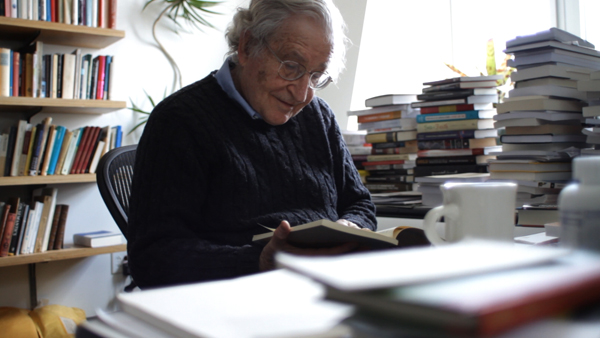Filmed over four years, the new documentary Requiem for the American Dream is the final, definitive long-form presentation of Noam Chomsky’s ideas on the interplay of power, capitalism, and democracy. Chomsky, arguably the foremost public intellectual of modern times, has been critiquing power and promoting democracy and solidarity for more than five decades in countless books, articles, and interviews. This is the best documentary featuring Chomsky’s ideas in quite some time and should be as popular as Manufacturing Consent.
Requiem focuses on how the power elite, a tinier and tinier fraction of society in recent decades, has been systematically concentrating wealth. A major consequence of this, in America and worldwide, is the decline of class mobility. The American Dream used to mean that, if you were born to middle class or poor parents and you worked hard and did well in school, you could become better off than your parents.
Now, Chomsky argues, that kind of upward mobility is all gone—young workers form what is increasingly known as the precariat, the precarious proletariat. Young people, instead of securing lifelong, reasonably stable, benefit-laden careers, have to patch together enough income to live on and bounce between part-time, short-term gigs. Chomsky details how worker insecurity is an intentional policy to aide in the concentration of wealth and power in the hands of what he calls “the masters of society.” The ultimate message is that democracy is not a natural state of affairs but must be consistently, actively maintained and improved.
Through in-depth interviews with Chomsky and with enough imagery and engaging editing to elevate it far beyond a lecture, the film skillfully emphasizes both that history is a struggle of power and the tenuousness of democracy. In recent years during his still-voluminous interview appearances, Chomsky is as articulate and lucid as ever, though his presentation can be lethargic and monotone. Here, he is a bit livelier than usual.
As only he can, Chomsky explains American history since the early 20th century as one ongoing narrative of democracy struggling, and losing, against the power imbalances of an arch-capitalist state. The main focus, however, is on the past few decades, in particular the conservative backlash to the democratizing tendencies of the revolutionary 1960s. Private business took back control, starting roughly with the conservative Reagan Revolution of 1980, and has only strengthened its grasp of affairs under the neoliberal capitalist ideology of the Clinton and the Obama administrations.
Additionally, business logic has infiltrated every aspect of human culture, politics, and society. The extension of business and market logic into all aspects of life has reduced the standard of living and the prospects of a better life for millions of Americans aspiring to enter a stable middle-class lifestyle that is markedly less accessible than it used to be. He also discusses how, starting roughly in the 1980s, banking and finance became much larger parts of the economy than ever, replacing traditional drivers of widespread economic growth like manufacturing.
With the presidential campaign of self-described Democratic Socialist Bernie Sanders being more successful than anyone predicted, it’s clear that anti-capitalist ideas are having a moment of relevance. The progressive, populist political moment lends an air of authority and inevitability to the themes of Requiem. It’s clear that this is a film about a thinker whose time has finally come.
Requiem for the American Dream is the clearest, most persuasive expression of Chomsky’s ideas yet, and required viewing for anyone interested in the fate of democracy under capitalism.

















Leave A Comment